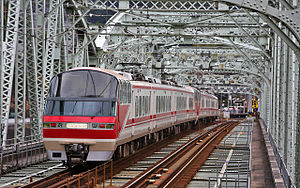
Summary
The Meitetsu Inuyama Line (名鉄犬山線, Meitetsu Inuyama-sen) is a 26.8 km Japanese railway line operated by the private railway operator Meitetsu (Nagoya Railroad),[2] which connects Biwajima Junction in Kiyosu with Shin-Unuma station in Kakamigahara. Together with the Meitetsu Kakamigahara Line, the line forms an alternate route of the Meitetsu Nagoya Main Line between Higashi-Biwajima and Meitetsu Gifu.
| Meitetsu Inuyama Line | |||||||||||||||||||||||||||||||||||||||||||||||||||||||||||||||||||||||||||||||||||||||||||||||||||||||||||||||||||||||||||||||||||||||||||||||||||||||||||||||||||||||||||||||||||||||||||||||||||||||||||||||||||||||||||||||||||||||||||||||||||||||||||||||||||||||||||||||||||||||||||||
|---|---|---|---|---|---|---|---|---|---|---|---|---|---|---|---|---|---|---|---|---|---|---|---|---|---|---|---|---|---|---|---|---|---|---|---|---|---|---|---|---|---|---|---|---|---|---|---|---|---|---|---|---|---|---|---|---|---|---|---|---|---|---|---|---|---|---|---|---|---|---|---|---|---|---|---|---|---|---|---|---|---|---|---|---|---|---|---|---|---|---|---|---|---|---|---|---|---|---|---|---|---|---|---|---|---|---|---|---|---|---|---|---|---|---|---|---|---|---|---|---|---|---|---|---|---|---|---|---|---|---|---|---|---|---|---|---|---|---|---|---|---|---|---|---|---|---|---|---|---|---|---|---|---|---|---|---|---|---|---|---|---|---|---|---|---|---|---|---|---|---|---|---|---|---|---|---|---|---|---|---|---|---|---|---|---|---|---|---|---|---|---|---|---|---|---|---|---|---|---|---|---|---|---|---|---|---|---|---|---|---|---|---|---|---|---|---|---|---|---|---|---|---|---|---|---|---|---|---|---|---|---|---|---|---|---|---|---|---|---|---|---|---|---|---|---|---|---|---|---|---|---|---|---|---|---|---|---|---|---|---|---|---|---|---|---|---|---|---|---|---|---|---|---|---|---|---|---|---|---|---|---|---|---|---|---|
 A Meitetsu 1000 series EMU on Inuyama Bridge | |||||||||||||||||||||||||||||||||||||||||||||||||||||||||||||||||||||||||||||||||||||||||||||||||||||||||||||||||||||||||||||||||||||||||||||||||||||||||||||||||||||||||||||||||||||||||||||||||||||||||||||||||||||||||||||||||||||||||||||||||||||||||||||||||||||||||||||||||||||||||||||
| Overview | |||||||||||||||||||||||||||||||||||||||||||||||||||||||||||||||||||||||||||||||||||||||||||||||||||||||||||||||||||||||||||||||||||||||||||||||||||||||||||||||||||||||||||||||||||||||||||||||||||||||||||||||||||||||||||||||||||||||||||||||||||||||||||||||||||||||||||||||||||||||||||||
| Native name | 名鉄犬山線 | ||||||||||||||||||||||||||||||||||||||||||||||||||||||||||||||||||||||||||||||||||||||||||||||||||||||||||||||||||||||||||||||||||||||||||||||||||||||||||||||||||||||||||||||||||||||||||||||||||||||||||||||||||||||||||||||||||||||||||||||||||||||||||||||||||||||||||||||||||||||||||||
| Owner | Meitetsu | ||||||||||||||||||||||||||||||||||||||||||||||||||||||||||||||||||||||||||||||||||||||||||||||||||||||||||||||||||||||||||||||||||||||||||||||||||||||||||||||||||||||||||||||||||||||||||||||||||||||||||||||||||||||||||||||||||||||||||||||||||||||||||||||||||||||||||||||||||||||||||||
| Locale | Aichi Prefecture, Gifu Prefecture | ||||||||||||||||||||||||||||||||||||||||||||||||||||||||||||||||||||||||||||||||||||||||||||||||||||||||||||||||||||||||||||||||||||||||||||||||||||||||||||||||||||||||||||||||||||||||||||||||||||||||||||||||||||||||||||||||||||||||||||||||||||||||||||||||||||||||||||||||||||||||||||
| Termini | |||||||||||||||||||||||||||||||||||||||||||||||||||||||||||||||||||||||||||||||||||||||||||||||||||||||||||||||||||||||||||||||||||||||||||||||||||||||||||||||||||||||||||||||||||||||||||||||||||||||||||||||||||||||||||||||||||||||||||||||||||||||||||||||||||||||||||||||||||||||||||||
| Stations | 17 | ||||||||||||||||||||||||||||||||||||||||||||||||||||||||||||||||||||||||||||||||||||||||||||||||||||||||||||||||||||||||||||||||||||||||||||||||||||||||||||||||||||||||||||||||||||||||||||||||||||||||||||||||||||||||||||||||||||||||||||||||||||||||||||||||||||||||||||||||||||||||||||
| Service | |||||||||||||||||||||||||||||||||||||||||||||||||||||||||||||||||||||||||||||||||||||||||||||||||||||||||||||||||||||||||||||||||||||||||||||||||||||||||||||||||||||||||||||||||||||||||||||||||||||||||||||||||||||||||||||||||||||||||||||||||||||||||||||||||||||||||||||||||||||||||||||
| Type | Commuter rail | ||||||||||||||||||||||||||||||||||||||||||||||||||||||||||||||||||||||||||||||||||||||||||||||||||||||||||||||||||||||||||||||||||||||||||||||||||||||||||||||||||||||||||||||||||||||||||||||||||||||||||||||||||||||||||||||||||||||||||||||||||||||||||||||||||||||||||||||||||||||||||||
| Daily ridership | 57,443[1] (FY2008) | ||||||||||||||||||||||||||||||||||||||||||||||||||||||||||||||||||||||||||||||||||||||||||||||||||||||||||||||||||||||||||||||||||||||||||||||||||||||||||||||||||||||||||||||||||||||||||||||||||||||||||||||||||||||||||||||||||||||||||||||||||||||||||||||||||||||||||||||||||||||||||||
| History | |||||||||||||||||||||||||||||||||||||||||||||||||||||||||||||||||||||||||||||||||||||||||||||||||||||||||||||||||||||||||||||||||||||||||||||||||||||||||||||||||||||||||||||||||||||||||||||||||||||||||||||||||||||||||||||||||||||||||||||||||||||||||||||||||||||||||||||||||||||||||||||
| Opened | 1910 | ||||||||||||||||||||||||||||||||||||||||||||||||||||||||||||||||||||||||||||||||||||||||||||||||||||||||||||||||||||||||||||||||||||||||||||||||||||||||||||||||||||||||||||||||||||||||||||||||||||||||||||||||||||||||||||||||||||||||||||||||||||||||||||||||||||||||||||||||||||||||||||
| Technical | |||||||||||||||||||||||||||||||||||||||||||||||||||||||||||||||||||||||||||||||||||||||||||||||||||||||||||||||||||||||||||||||||||||||||||||||||||||||||||||||||||||||||||||||||||||||||||||||||||||||||||||||||||||||||||||||||||||||||||||||||||||||||||||||||||||||||||||||||||||||||||||
| Line length | 26.8 km (16.65 mi) | ||||||||||||||||||||||||||||||||||||||||||||||||||||||||||||||||||||||||||||||||||||||||||||||||||||||||||||||||||||||||||||||||||||||||||||||||||||||||||||||||||||||||||||||||||||||||||||||||||||||||||||||||||||||||||||||||||||||||||||||||||||||||||||||||||||||||||||||||||||||||||||
| Track gauge | 1,067 mm (3 ft 6 in) | ||||||||||||||||||||||||||||||||||||||||||||||||||||||||||||||||||||||||||||||||||||||||||||||||||||||||||||||||||||||||||||||||||||||||||||||||||||||||||||||||||||||||||||||||||||||||||||||||||||||||||||||||||||||||||||||||||||||||||||||||||||||||||||||||||||||||||||||||||||||||||||
| Electrification | 1,500 V DC, overhead catenary | ||||||||||||||||||||||||||||||||||||||||||||||||||||||||||||||||||||||||||||||||||||||||||||||||||||||||||||||||||||||||||||||||||||||||||||||||||||||||||||||||||||||||||||||||||||||||||||||||||||||||||||||||||||||||||||||||||||||||||||||||||||||||||||||||||||||||||||||||||||||||||||
| Operating speed | 110 km/h (68 mph) | ||||||||||||||||||||||||||||||||||||||||||||||||||||||||||||||||||||||||||||||||||||||||||||||||||||||||||||||||||||||||||||||||||||||||||||||||||||||||||||||||||||||||||||||||||||||||||||||||||||||||||||||||||||||||||||||||||||||||||||||||||||||||||||||||||||||||||||||||||||||||||||
| |||||||||||||||||||||||||||||||||||||||||||||||||||||||||||||||||||||||||||||||||||||||||||||||||||||||||||||||||||||||||||||||||||||||||||||||||||||||||||||||||||||||||||||||||||||||||||||||||||||||||||||||||||||||||||||||||||||||||||||||||||||||||||||||||||||||||||||||||||||||||||||
Stations edit
● Local (普通, futsū) (L)
● Semi-Express (準急, junkyū) (S)
● Express (急行, kyūkō) (E)
● Rapid Express (快速急行, kaisoku kyūkō) (R)
● Limited Express (特急, tokkyū) (LE)
● Rapid Limited Express (快速特急, kaisoku tokkyū) (RL)
● μSKY Limited Express (ミュースカイ, myū sukai) (MU)
All trains stop at stations marked "●" and pass stations marked "|". Some trains stop at "▲".
| No. | Station | Japanese | Distance (km) |
L | S | E | R | LE | RL | MU | Transfers | Location | |
|---|---|---|---|---|---|---|---|---|---|---|---|---|---|
| Biwajima Junction | 枇杷島分岐点 | - | | | | | | | | | | | | | | | ■ Meitetsu Nagoya Main Line | Kiyosu | Aichi | |
| Shimo-Otai | 下小田井 | 1.0 | ● | | | ▲ | | | | | | | | | ||||
| Naka-Otai | 中小田井 | 2.4 | ● | | | ▲ | | | | | | | | | Nishi-ku, Nagoya | |||
| Kami-Otai | 上小田井 | 3.5 | ● | ● | ● | ● | | | | | | | Nagoya Subway: ■ Tsurumai Line (T01) | |||
| Nishiharu | 西春 | 5.9 | ● | ● | ● | ● | | | | | | | Kitanagoya | |||
| Tokushige-Nagoya-Geidai | 徳重・名古屋芸大 | 7.3 | ● | | | | | | | | | | | | | ||||
| Taisanji | 大山寺 | 8.1 | ● | | | | | | | | | | | | | Iwakura | |||
| Iwakura | 岩倉 | 9.7 | ● | ● | ● | ● | ● | ● | ● | ||||
| Ishibotoke | 石仏 | 11.8 | ● | ● | | | | | | | | | | | ||||
| Hotei | 布袋 | 14.2 | ● | ● | ● | ● | | | | | | | Kōnan | |||
| Kōnan | 江南 | 16.2 | ● | ● | ● | ● | ● | ● | ● | ||||
| Kashiwamori | 柏森 | 19.0 | ● | ● | ● | ● | ● | ● | ▲ | Fusō | |||
| Fusō | 扶桑 | 21.2 | ● | ● | ● | ● | | | | | | | ||||
| Kotsuyōsui | 木津用水 | 22.6 | ● | ● | | | | | | | | | | | ||||
| Inuyamaguchi | 犬山口 | 24.0 | ● | ● | | | | | | | | | | | Inuyama | |||
| Inuyama | 犬山 | 24.9 | ● | ● | ● | ● | ● | ● | ● | ■ Meitetsu Komaki Line ■ Meitetsu Hiromi Line | |||
| Inuyama-Yūen | 犬山遊園 | 26.1 | ● | ● | ● | ● | ● | ● | ● | ||||
| Shin-Unuma | 新鵜沼 | 26.8 | ● | ● | ● | ● | ● | ● | ● | ■ Meitetsu Kakamigahara Line Takayama Main Line |
Kakamigahara | Gifu | |
History edit
The Nagoya Electric Railway (later Meitetsu) opened the Biwajima to Iwakura section, as an interurban electrified at 600 V DC, in 1910. The line was extended to Inuyama in 1912 built with double tracks. In 1922, the Biwajima to Iwakura section was double-tracked, and in 1926, the line was extended as dual track to Shin-Unuma, including a combined rail and road bridge over the river Kiso.
In 1948, the voltage was increased to 1,500 V DC, and in 1993 through services commenced on the Nagoya Municipal Subway Tsurumai Line. The road utilising the Kisogawa rail bridge was diverted onto its own bridge in 2000, ending the last such combined bridge usage in Japan.
Former connecting lines edit
- Iwakura Station: The Nagoya Electric Railway opened a 7 km line electrified at 600 V DC to Ichinomiya on the Meitetsu Nagoya Line Main line in 1913. The voltage on the line was increased to 1,500 V DC in 1948, and the line closed in 1965. The company opened a 6 km line electrified at 600 V DC to Komaki on the Meitetsu Komaki Line Komaki line in 1920. The voltage on the line was increased to 1,500 V DC in 1955, and the line closed in 1964.


